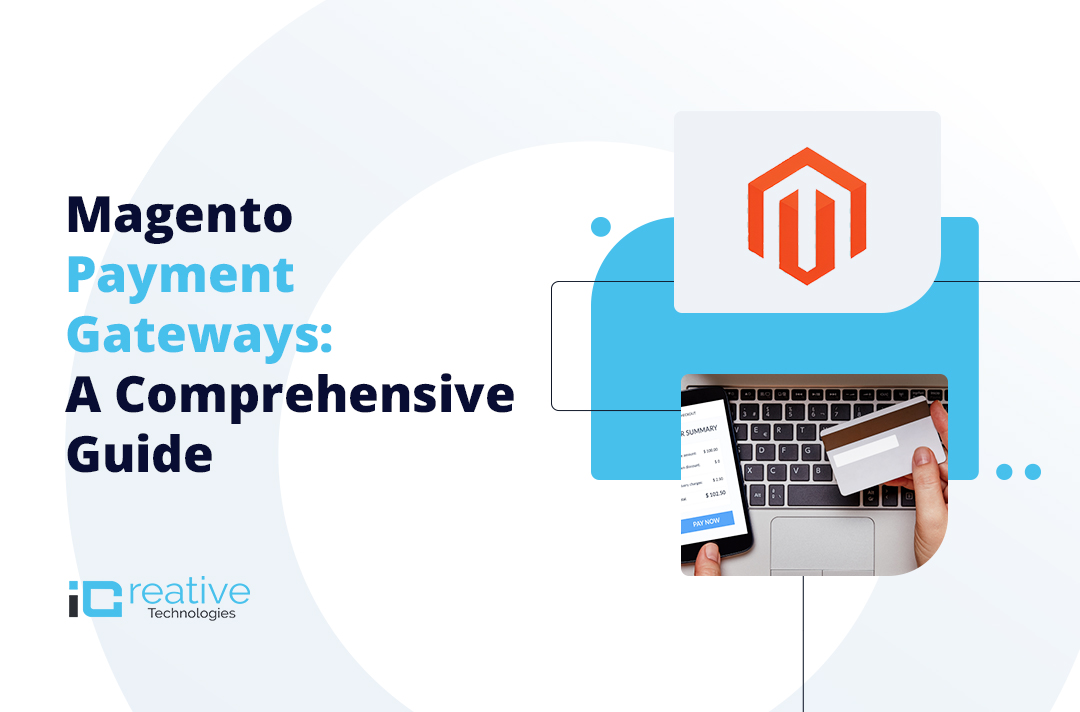Magento Payment Gateways: A Comprehensive Guide

Many eCommerce business owners have felt the pain of losing a potential customer at the exact moment when they are ready to click ‘Buy Now.’ This is the result of payment failures. In the highly competitive world of e-commerce, such interruptions can be the real difference between success and failure.
Interestingly, around a tenth of online shoppers abandon their buying process due to payment-related issues. This percentage speaks for the importance of payment gateways in making transactions smooth.
Among the eCommerce platforms, Magento has emerged as a powerhouse, celebrated for its versatility and scalability. This article discusses Magento payment gateways, focusing on their importance, characteristics, and best practices for integration.
What are Magento payment gateways?
A payment gateway acts as an intermediary between a consumer’s banking institution and a merchant’s retail establishment, facilitating the secure electronic transaction of funds. Payment gateways in Magento are essential as all transactions are encrypted, validated, and processed without errors.
Magento’s strength is its seamless integration with almost all the available payment solutions, from international giants like PayPal and Stripe to regional players like Razorpay. This permits merchants to service diverse customer needs with security at the forefront.
You need to look for the standout features of Magento payment gateways.
The features to watch for in your Magento payment gateway will play a huge role in the success of your business. Here’s a detailed breakdown of what to focus on:
They Shouldn’t be compromising on Security
33 billion accounts were expected to be breached in 2023, which then was 2328 accounts per day. A whopping 97 cybercrime victims per hour. Customer data protection isn’t a luxury but a much-needed requirement. You should choose gateways that comply with PCI-DSS (Payment Card Industry Data Security Standard) and cutting-edge encryption and tokenization technologies. The stronger the security, the better the defense against data breaches and fraud.
Transactions should be blazing fast.
A delay of 2 seconds may increase cart abandonment rates up to 87%. Modern shoppers expect seamless, nearly instant transactions. Look for gateways that combine speed with reliability and check whether every payment is processed without compromising data safety or not.
Is it globally scalable?
Because cross-border e-commerce is expected to reach $7.9 trillion by 2030, supporting international customers is of great importance. You should select gateways that support multi-currency payments, integrate easily with global banking systems, and are customized in native languages.
Does it have diverse payment options?
70 percent of shoppers are more likely to finalize purchases if given a preferred payment option. From credit and debit cards to digital wallet options such as Apple Pay and Google Pay and regional-specific options like UPI or Klarna, your gateway should accommodate each shopper’s choice. In addition, services such as BNPL will raise conversion rates.
These are the most popular payment gateway options for your eCommerce store:
The flexibility of Magento gives merchants a wide variety of payment gateway options. The following are some of the most commonly used options:
PayPal

PayPal is one of the widely recognized and trusted payment gateways in the world. It’s pretty easy to integrate with Magento, thus highly preferred by merchants. PayPal features Express Checkout, which allows customers to complete their transactions with a few clicks, thereby reducing cart abandonment rates.
In addition, PayPal offers buyer protection, making it a reliable option for customers and boosting their confidence in your store. Whether doing business locally or globally, PayPal ensures that payments are processed smoothly.
Stripe

Stripe stands as the developers’ favored payment gateway, celebrated for its customizable API and extensive support for an array of payment methods. Through Stripe, merchants can seamlessly accept payments from various credit and debit cards and Apple Pay, Google Pay, and other localized options.
What sets Stripe apart is its remarkable capacity to manage recurring subscriptions, making it an ideal choice for businesses that provide subscription-based services. Its seamless integration with Magento and flexible payment options make Stripe an excellent option for emerging businesses.
Authorize.Net

Regarding fraud protection and security, Authorize.Net is one of the most secure payment gateways. This payment gateway has advanced fraud detection tools and ensures secure payments via tokenization and 3D Secure, thus making it a perfect option for merchants focusing more on security.
It is also very smooth and combines perfectly with Magento, making it easy for merchants to accept payments while securing sensitive customer information. Authorize.Net is a reliable solution for businesses that want to protect themselves against fraud and chargebacks.
Square

Square is relatively straightforward and simple in its setup and thus very attractive to small and medium-sized businesses. Apart from the payment processing function, Square also offers inventory management and analytics functions, which enables merchants to keep track of stock levels and understand how their business is performing.
In addition, the POS system from Square can seamlessly integrate with Magento, making it a great fit for businesses with both online and offline presence.
Braintree

Because PayPal owns Braintree, it has many merchant-friendly attributes, including recurring billing, split payments, and a currency support mechanism. These qualities position Braintree in an elite league of great solutions for expanding into international markets.
Whether running a global marketplace or managing subscription sales, Braintree allows for the accommodation of multiple forms of payment as well as different currencies, making international transactions streamlined for you to focus on business development.
Other Niche Gateways

While the big players continue to dominate the global eCommerce landscape, there are many regional payment gateways that are steadily gaining momentum.
Razorpay, for instance, is tailored to the Indian market, offering features like EMI payments and support for local debit and credit cards, making it an excellent choice for businesses with a strong foothold in India. Similarly, Mollie is popular across Europe.
How to Integrate Payment Gateways with Magento
You can add a payment gateway to your Magento store without too much hassle. Follow this streamlined guide:
Step-by-Step Guide
- Navigate to the Magento Admin Panel.
- Go to the “Stores” section and select “Configuration.”
- Under “Sales,” click on “Payment Methods.”
- Choose your desired gateway and follow the prompts to configure settings like API keys and credentials.
Integration is mainly done for Magento 2 users through extensions available on the Magento Marketplace. These extensions make the setup process easier and ensure compatibility with the platform’s latest features.
Wrapping Up,
When choosing a payment gateway for a Magento store, the balance to be struck here is between security, speed, and customer convenience. Understanding these options, effectively integrating them, and optimizing their performance will help create a seamless shopping experience that drives conversions and fosters loyalty.
You must evaluate the business requirements, observe the available payment gateways, and shortlist those aligned with your goals. So what are you waiting for? Let’s connect now to integrate excellent Magento payment methods!





